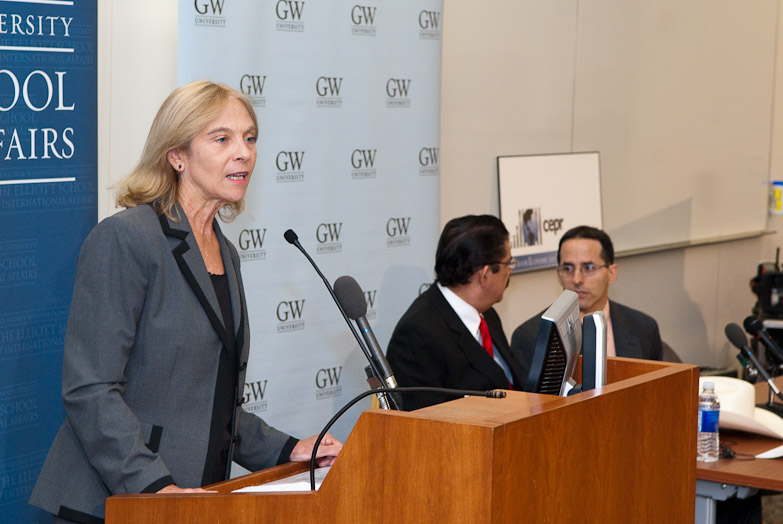Washington, DC
Aug 31, 2009
(GMT-5)
CEPR and George Washington University's Latin American and Hemispheric Studies Program hosted a discussion with H.E. José Manuel Zelaya Rosales, President of the Republic of Honduras. CEPR Co-Director Mark Weisbrot provided an introduction and Cynthia McClintock, Director of GW's Latin American and Hemispheric Studies Program, moderated.
Two months following the coup d'etat that sent him into a forced exile, President Zelaya of Honduras discussed his attempts to negotiate peace and a return to a democratic and constitutional order in Honduras.
Watch video coverage of the event from CSPAN.
Listen to the entire event (English/English translation).
Segments:
Cynthia McClintock's Introduction
President Zelaya's Speech (English translation overdubbed)
President Zelaya's Speech (Spanish)
Q&A (English translation overdubbed)
Q&A (Spanish)
See these related CEPR Press Releases:
IMF May Withhold $164 Million Allocated to Honduras, September 4, 2009
State Department Steps Against Honduran Coup Don't Go Far Enough, September 3, 2009
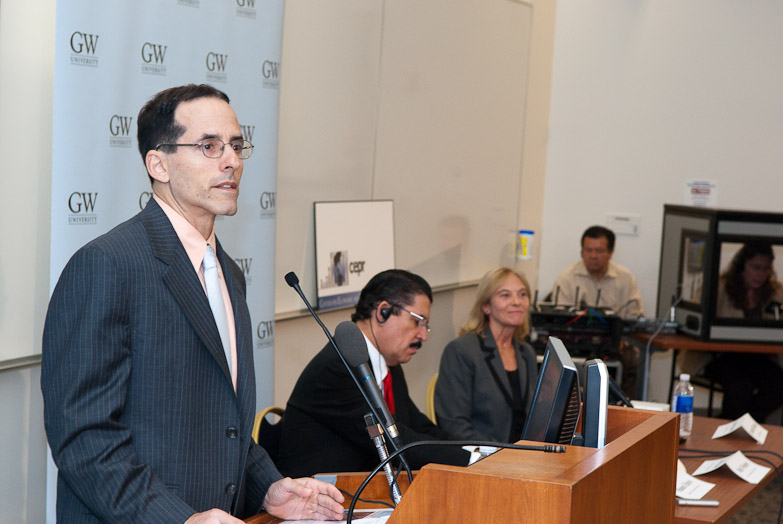 |
|
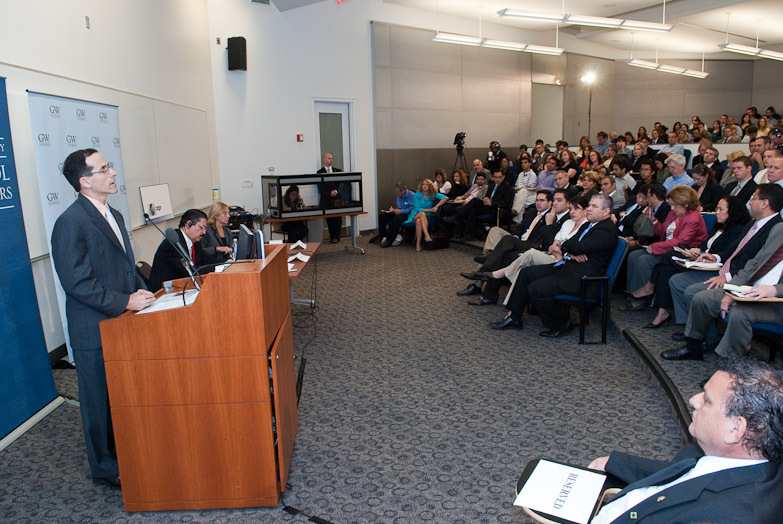 |
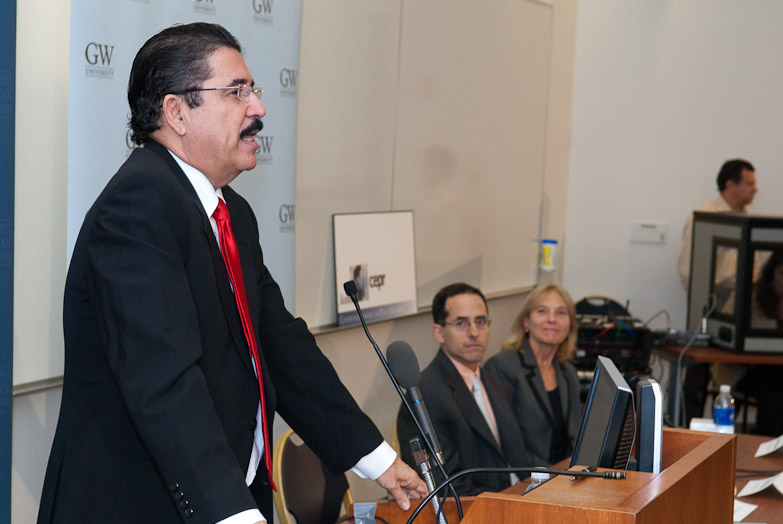 |
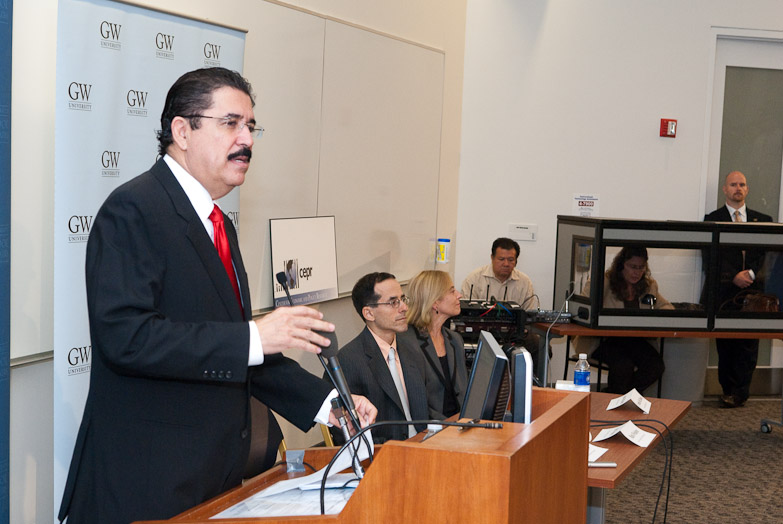 |
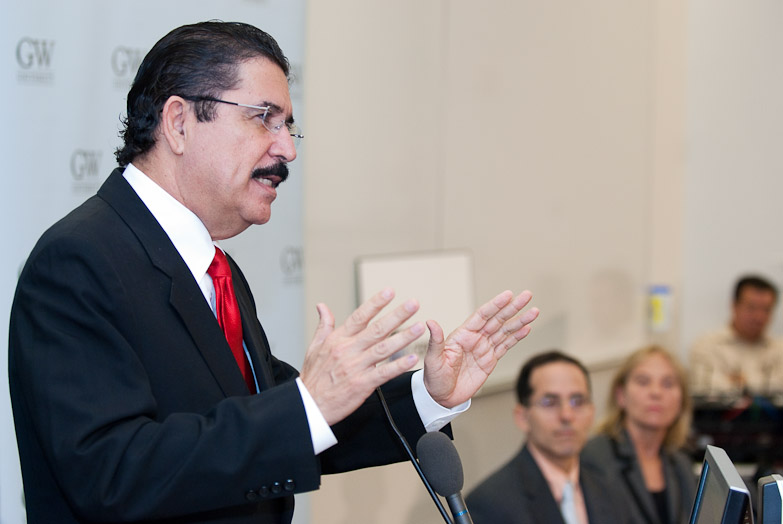 |
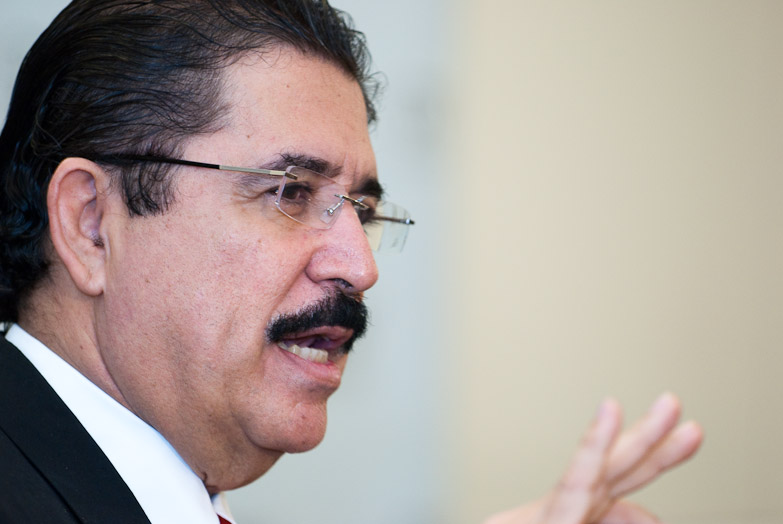 |
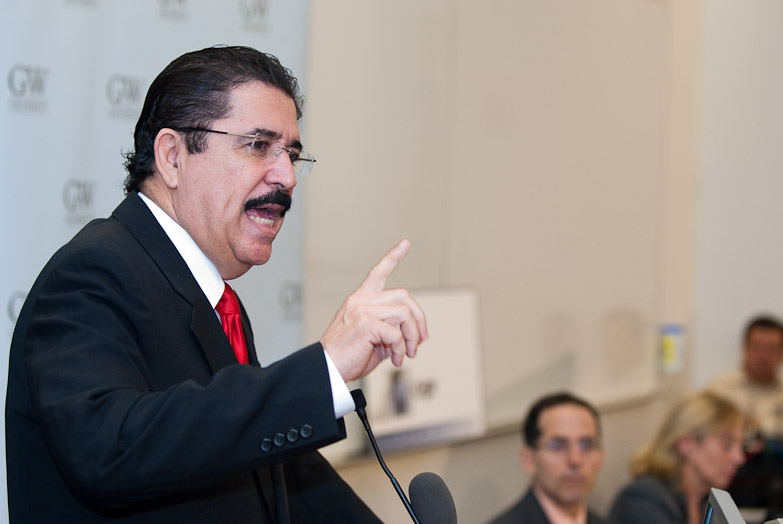 |
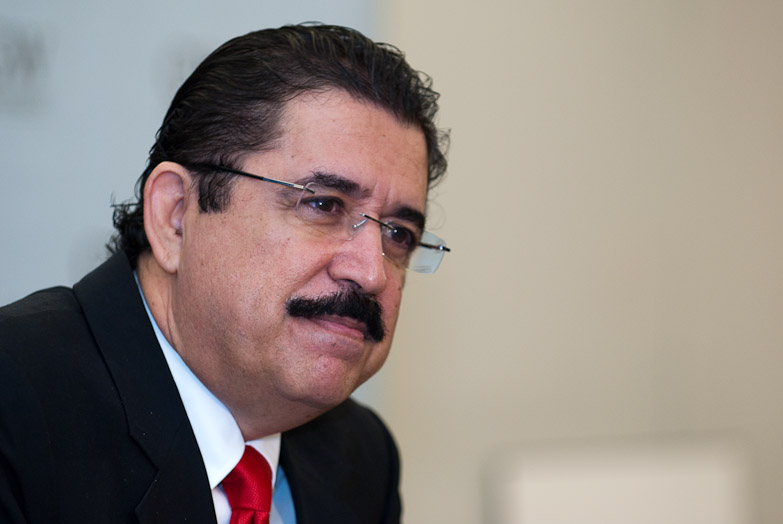 |
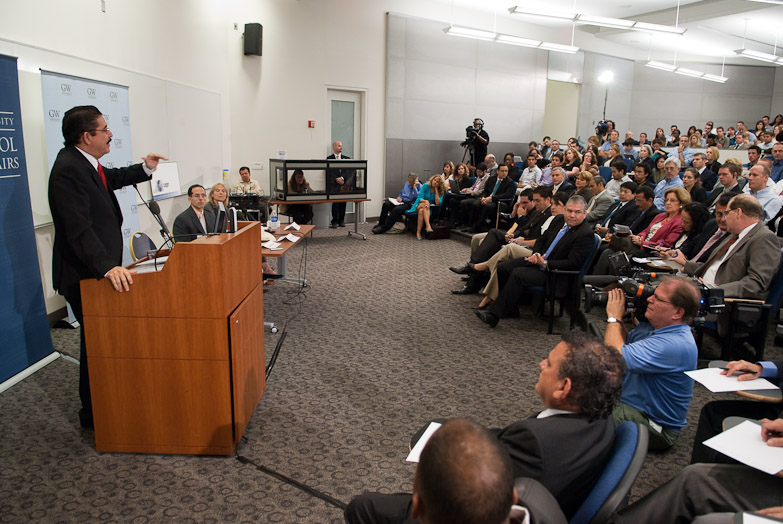 |
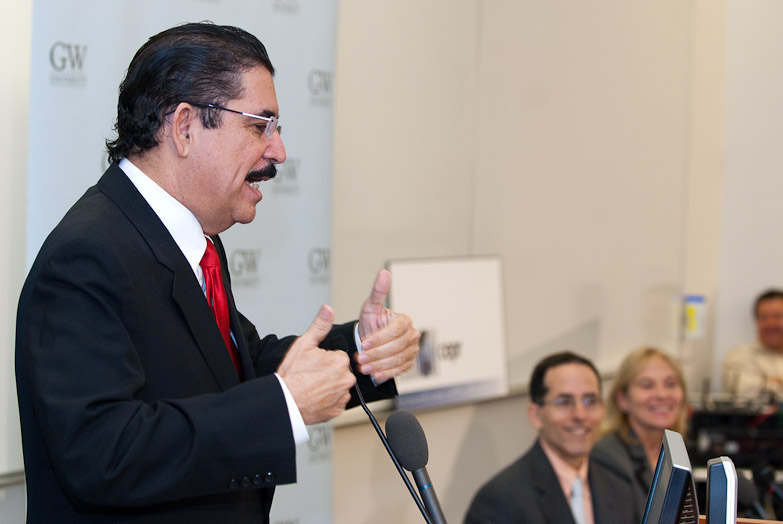 |
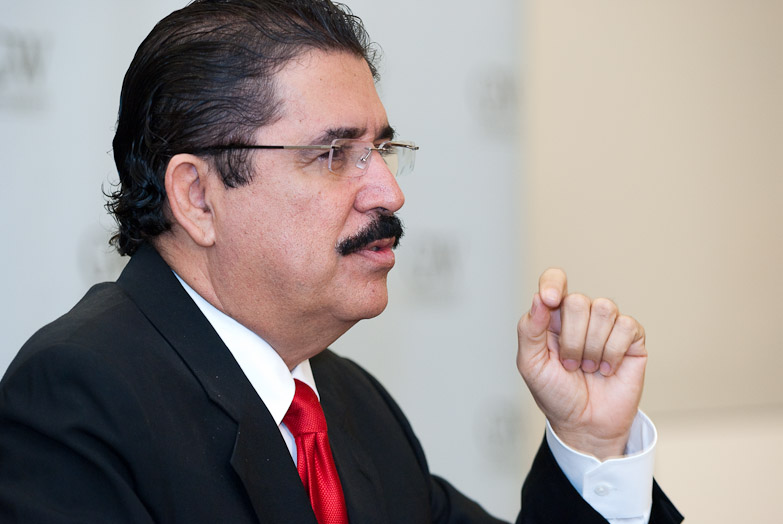 |
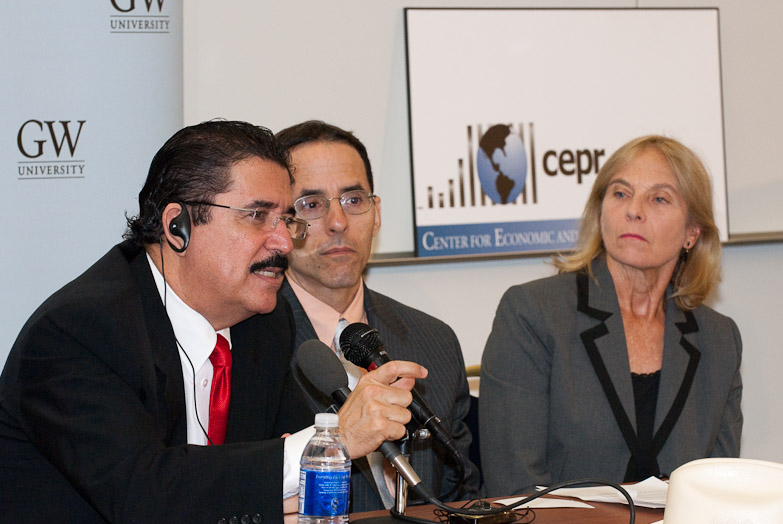 |
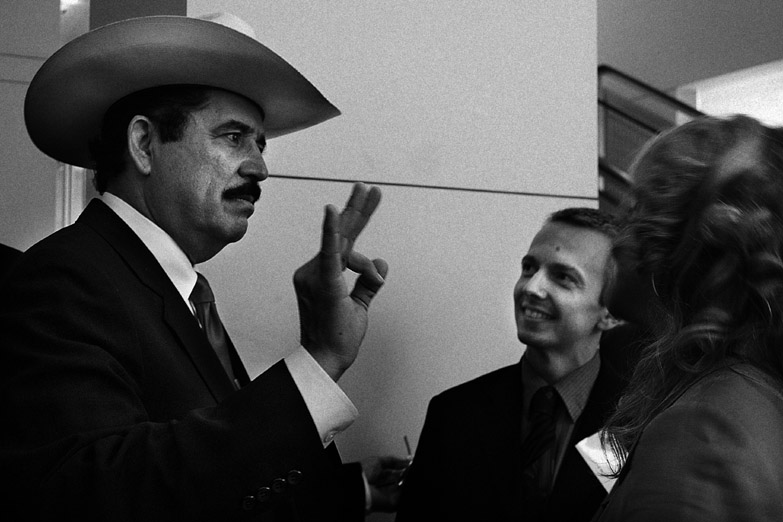 |
More photos can be found here, courtesy of Jeremy Bigwood.
Introduction by Mark Weisbrot
I want to thank all of you for coming to this event. Special thanks to Cynthia McClintock the Director of Latin American and Hemispheric Studies Program here at GWU for helping to organize and moderate this event; and to Dan Beeton and my colleagues at the Center for Economic and Policy Research. And to the Embassy of Honduras, and especially to President Zelaya for taking this time to speak with us.
I will briefly provide some background information for this talk. As many of you know, on June 28, the Honduran military stormed President Zelaya’s home and took him, at gunpoint, out of the country. A de facto government, run by supporters of this military coup, was then formed and remains in power.
The world reaction to the overthrow of Honduran democracy was swift and determined. The Organization of American States, the General Assembly of the United Nations, and other international bodies unanimously called for the “immediate and unconditional return” of President Zelaya.
The response from Washington has been more ambivalent and ambiguous, characterized by inconsistency and mixed messages. The first statement from White House did not take sides between the coup government and the democratically elected president. Later statements rejected the coup, but on more than one occasion Secretary of State Hillary Clinton was asked if “restoring the constitutional order” in Honduras meant bringing back the elected president. She declined to say yes.
On August 4, the State Department sent a letter to Republican Senator Richard Lugar that was widely seen as retreating from some of its prior statements in support of the elected president of Honduras.
Today, more than two months after the coup – quite astonishingly -- the U.S. State Department has yet to determine that the Honduran military’s overthrow of President Zelaya was actually a military coup. Under U.S. law, if our government were to recognize this fact, it would be required to cut off aid to the de facto government of Honduras. And so, although a small fraction of US aid -- $18.5 million – has been cut, tens of millions of dollars more continue to flow to the dictatorship.
But most disturbing of all has been the Administration’s deafening silence about the human rights abuses committed since June 28th by the Honduran dictatorship. The shootings, the arbitrary arrest of thousands, the police beatings and brutality against peaceful protestors, the closing down of independent radio and TV stations – all of this has been documented and denounced by major human rights organizations throughout the world: the OAS Inter-American Commission on Human Rights, Amnesty International, Human Rights Watch, as well as Honduran and European rights organizations.
Yet the Obama Administration remains silent.
I say these things not to criticize the Obama administration, but to appeal for your help. I voted for President Obama and was one of the first people out in the streets here in Washington celebrating his victory on election eve. We all looked forward to a new foreign policy, including one in this hemisphere. And I still expect to see the changes that we voted for.
There is no doubt that the government of the United States has the power to reverse this coup. And in the last two months it has responded to pressure from both within and outside the United States. Sixteen members of the U.S. Congress sent a letter to President Obama on August 7 asking him to denounce the repression committed by the Honduran dictatorship, freeze the bank accounts of coup leaders and deny them visas to the United States.
The Union of South American Nations has announced that it will not recognize any government that is elected in Honduras under the dictatorship; and on August 17 the presidents of Mexico and Brazil signed a joint statement saying the same thing. It appears that the Organization of American States will follow.
All of this has been noticed by the Administration, and last week the State Department moved a step closer to officially recognizing that a military coup has taken place.
So I ask all of you here today, or watching this on television or the internet – take a moment to ask President Obama to live up to his promises. If you are representing another government in this hemisphere, or are just a citizen – please try to get your government to speak out about the systematic repression in Honduras. As numerous presidents have noted, this coup is a threat to democracy throughout the region. The days when the military could overturn the will of the electorate were supposed to have gone away with the last century. We cannot afford to go back to those days.
President Zelaya was overthrown because powerful special interests objected to his efforts to help and empower the poor majority of Honduras. In his first two years he succeeded in reducing poverty by 10 percent. He won a 60 percent increase in the minimum wage; and a large increase in elementary school enrollment by abolishing tuition fees.
These are the real reasons for the coup, which differ greatly from the fictional ones that we read and hear every day. But I will let President Zelaya give you a first hand version of this story. History will record him as a hero for standing up to powerful entrenched interests and risking his life for democracy. We welcome President Zelaya.
[A transcript of President Zelaya's speech can be found here.]




